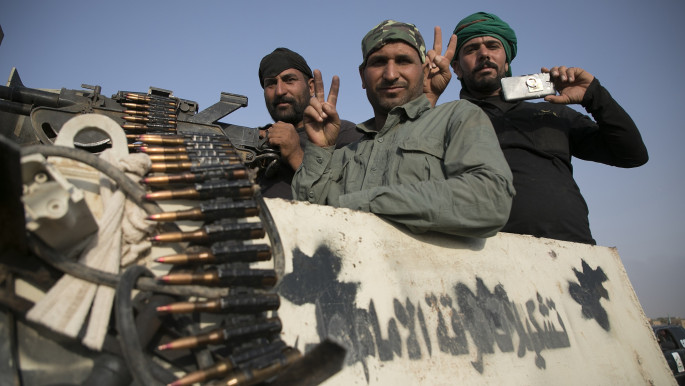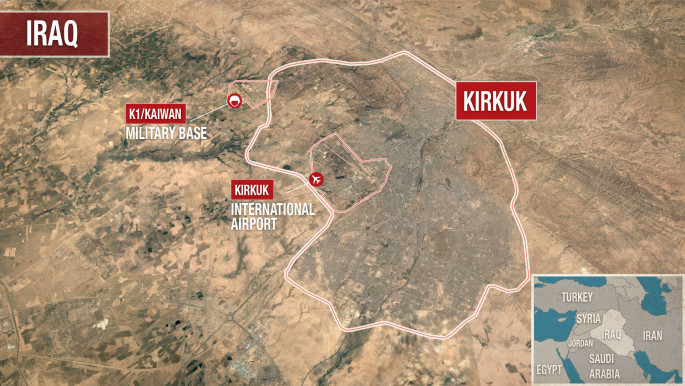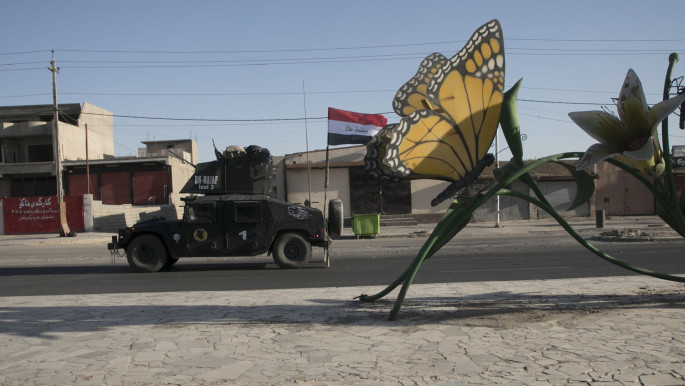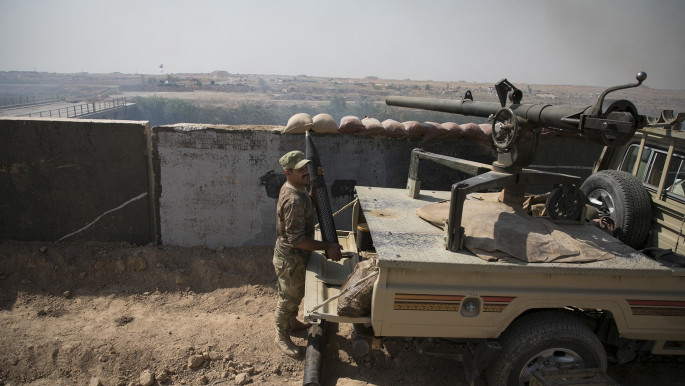 |
| Iran-backed Popular Mobilisation Forces, paired with Iraqi army units, took the city of Kirkuk in just hours and met with little resistance [Adam McCaw/AMYKmedia] |
'Mass exodus'
Kirkuk is home to more than one million Kurdish, Arab and Turkmen civilians. Its two main ethnicities define the city's population, to the north Arab and to the south Kurdish. But when the PMF came, everyone left together.
 |
A mass exodus of families leaving the besieged city filled both the east and westbound lanes in an effort to flee from potential bloodshed.
Vehicles lined the horizon as far as the eye can see in either direction. Thousands of families packed into their cars slowly pushed east towards the Kurdish city of Sulaimaniya.
The Peshmerga, whose numbers were slowly regrouping watched, helpless, as their countrymen and women fled.
"This is a practice these people know too well," a Kurdish soldier said, overlooking the packed road. "They are scared of Hash'd al-Shaabi," he said, using the Arabic name for the PMF.
Comment: Abadi's capture of Kirkuk might just save Iraq
Rumours quickly spread of PMF soldiers killing civilians and burning homes in Tuz Khurmatu, home to the Patriotic Union of Kurdistan (PUK), and nearby Daquq, to the south of Kirkuk.
"Many people call me, talking about killings, stealing cars, stealing their homes, and setting them on fire," said Peshmerga General Jamal Musen-Jahafar. "Even the Arabs fear them; they are Sunni, the Hash'd is Shia.
"This is why we want independence; they always kill us, they take our land, they burn our homes, they [Arabs] don't want to be brothers. This is why we vote in the referendum - we can take no more. We just want peace and we want to live."
A fellow soldier's face, full of tears, fell into his hands behind the general. Many Arab civilians feared that once the Shia group took control of the city, they would turn their guns on Sunni Muslims.
 |
| Iraqi Special Forces patrol the streets of Kirkuk in a 'presence patrol' the day after Kurdish forces left [Adam McCaw/AMYKmedia] |
A formidable Iranian proxy
The Shia militia group has grown into a formidable fighting force in Iraq. Funded and operated as an Iranian proxy, the PMF's strong presence in recent battles has reaffirmed Iran's commitment both to fighting the Kurdish KRG and gaining influence in the Iraqi government.
"Iran's role in the offensive further strengthens its influence within Iraq, sidelines the US, and will increase Arab Shiite popular support for Iranian-backed candidates in Iraq's upcoming elections, currently scheduled for April 2018," reports The Institute for the Study of War.
General Musen-Jahafar shakes his head. "The PMF is not Iraqi, they're Iranian. We are more Iraqi then the Hash'd - and we are Kurdish!"
Blog: Facing off at Kirkuk - caught between Iraq's army and the Peshmerga
Iran's growing leverage in Baghdad has been increasing in spite of US efforts to re-stabilise the country after the Islamic State group took control of much of the tribal lands three years ago. The Kurdish general says the Iranian proxy groups "have American weapons, American tanks".
He feels his Peshmerga forces are getting the short end of the stick, despite its long-term relationship with the US and its alignment with Washington's interests in the region.
As the day continued, there was one question on everyone's mind. Where was America?
During the failed negotiations between Baghdad and the KRG, the US threated to use its air force against the first aggressor to break the deadlock south of the city.
"We are tied," the general said, putting both of his hands behind his back. "The Hash'd kill us, and USA say we can't fight or they attack us. We are stuck."
 |
| A Kurdish Peshmerga soldier readies his M-40 recoilless rifle, as a standoff between them and the Hash’d al-Shaabi working with Iraqi forces becomes tense, south of Kirkuk [Adam McCaw/AMYKmedia] |
Where is America?
"What happened to the US military? They don't stand for their word. Why do they not help us? In 2003, 2010, Kurds help America's plan. We fought Daesh [IS], we fought al-Qaeda after September 11, and we fought Saddam in the 90s. They ask [the Kurds] for support - but don't support us when we need them most."
The general speaks while he looks out over the streams of civilians still pouring out of the city. He shakes his head again. "Twenty-five of my family were killed fighting for American plans, since 1988,” he adds.
A statement from the US embassy in Baghdad downplayed the scale of the clashes and reaffirmed Iraq's sovereignty in the city: "We support the peaceful reassertion of federal authority, consistent with the Iraqi constitution, in all disputed areas."
Two days after the Iraqi forces took Kirkuk, civilians have started to return. Cars with Iraqi flags drive, honking, down main roads, as celebratory gunfire is heard throughout the city.
In a statement released on Wednesday, the General Command of the Peshmerga Forces called the attack on Kirkuk "a clear declaration of war against the people of Kurdistan", and, "the Peshmerga will bravely defend their people". To those who re-took the city, they say: "They will pay a heavy price for their crimes."
But as business-as-usual has appeared to return to the city, the future of the Iraqi-Kurdish conflict remains unknown.









 Follow the Middle East's top stories in English at The New Arab on Google News
Follow the Middle East's top stories in English at The New Arab on Google News


